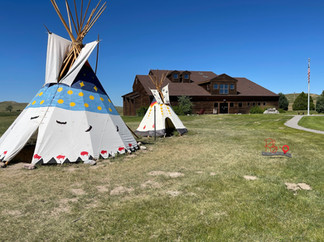One of the stops on our road trip through Nebraska this summer was Agate Fossil Beds National Monument in the northwest region of the state. If you love science and history, this might be an interesting place for you to visit. You won't happen upon this national monument; you'll have to make an effort to get there. It's along a local road named River Road off State Highway 29 near Harrison.
We had never heard of the Agate Fossil Beds but visited upon the recommendation of a guide at the Ashfall Fossil Beds in northeast Nebraska about a week earlier. We have to say that the recommendation was a good one. The two sites are very different with each having their own merits. You can read about our earlier visit to Ashfall by clicking the link above.
The tranquility of the rolling hills of Nebraska farmland made the journey to Agate Fossil Beds National Monument enjoyable. Upon arriving at the Visitor Center, our vehicle was one of only a handful in the parking lot. Essentially, we had the place to ourselves. Staff greeted us as we entered the building and gave us a quick orientation about the site. They encouraged us to stroll through the center and then made themselves available for any questions. They were quite friendly and welcoming.
The Visitor Center is small, but very nice. There is a short movie that describes the history of the area. We learned that most of the land that is now a part of the national monument at one time belonged to local rancher James Cook and his wife, Kate. The couple discovered a bone bed on their cattle ranch in the late 1800s. Shortly thereafter, the area was visited by scientists who discovered a variety of animals now extinct or who are represented by modern descendants. Displays showing the types of mammal fossils discovered are housed within the Visitor Center. Learning about animals like beardogs, rhinos and camels that roamed Nebraska almost 23 million years ago is fascinating.
Guests to the Agate Visitor Center can walk through a museum containing the James H. Cook Collection of Lakota Artifacts. The artifacts were gifts given to Cook by Chief Red Cloud and other Lakota and Cheyenne leaders. The story of Cook's friendship with Chief Red Cloud is detailed in the museum.
If you enjoy a good trek outside, there are a couple of trails to hike at the monument. One trail takes you to the historic dig site and the other to fossils in the side of a hill. A fascinating spiral-shaped fossil known as Devil's Corkscrew is displayed on one of the trails. It is thought these unique spiral fossils were created by prehistoric beavers digging their burrows.
We recommend you take the time to go to Agate Fossils if you're in the northwest region of Nebraska. Make sure you pack a lunch or some snacks and bring water for your hike. If you have a U.S. National Parks Passport book, be sure to bring it with you to the Visitor Center and collect your stamp.
There is no charge to visit Agate Fossil Beds National Monument. More information about Agate can be found online at the National Parks Service website.
Thanks for reading our blog and don't forget to subscribe for free to Ruby's Winding Road so you don't miss a post. Look for the subscribe form at the bottom of this page. Also, check out our other summer blog posts and photos at RubysWindingRoad.com. In the meantime, we'll be out wandering.












Comentarios